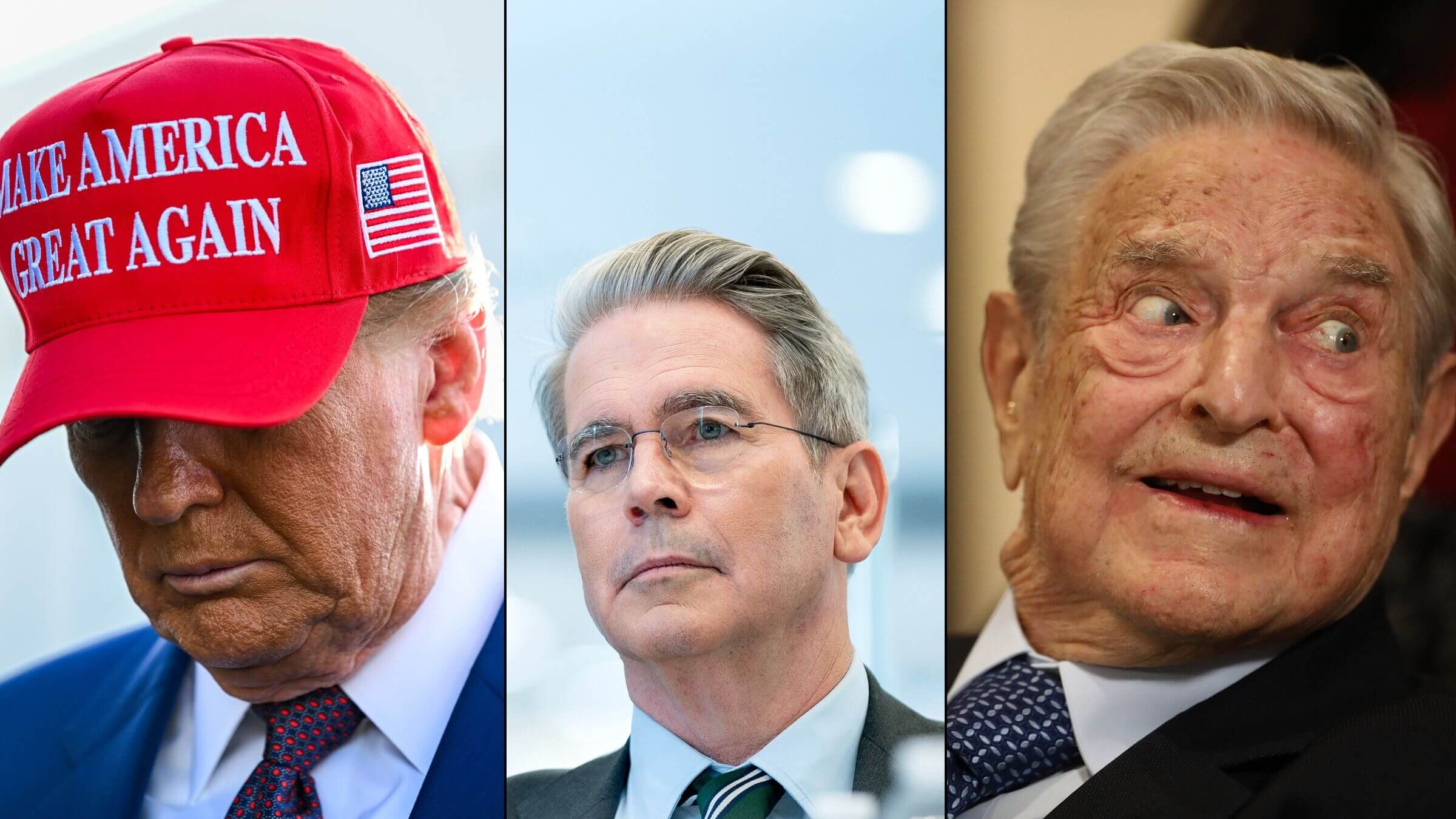What Trump’s appointment of a Soros protege tells us about the right’s real priorities
The president-elect pushes endless conspiracy theories about Soros — why elevate one of his colleagues?

From left to right: President-elect Donald Trump, Scott Bessent, and George Soros. Photo by Brandon Bell/Stefani Reynolds/Bloomberg/Simon Dawson/Bloomberg/Getty Images
A hallmark of President-elect Donald Trump’s time in politics has been his consistent insistence on pushing antisemitic conspiracy theories about George Soros, the Hungarian-born Jewish billionaire financier and philanthropist.
In 2018, the then-president said he “wouldn’t be surprised” if it turned out that Soros was paying for a caravan of Central American migrants making its way toward the U.S. border. That same year, amid protests against Trump’s nomination of Brett Kavanaugh to the Supreme Court, Trump tweeted that signs referencing sexual assault allegations against Kavanaugh were “Paid for by Soros and others.” Last year, a Trump fundraising email depicted the Holocaust survivor, now in his early 90s, as a “puppet master” controlling President Joe Biden. And after being convicted on 34 felony counts earlier this year, Trump said the conviction was due to “a Soros-backed D.A.” (The district attorney, Alvin Bragg, had as a candidate received money from Color of Change, an organization that had separately received money from Soros.)
And so, it may have initially seemed surprising when Trump nominated Scott Bessent, a Soros protegee, to lead the Treasury Department. Bessent, after all, worked with Soros in maybe the single most influential thing he’s ever done: the 1992 “breaking” of the Bank of England, in which Soros led a group of investors in betting against the pound so successfully that its value came crashing down, leading Britain to exit the European exchange rate mechanism. How could Trump — who has built a large part of his public profile on the idea that Soros is a too-powerful puppet master trying to flood the country with migrants and degrade the judiciary— bear to work with someone who helped Soros force a currency out of an economic system?
The answer: Trump, like the many politicians around the globe who have broadcasted similar antisemitic conspiracies about Soros, does not attack Soros because he is actually changing the demographics of various nation states by paying migrants to come in — he isn’t — or because he is spurring protesters to take to the streets — he isn’t — or because he’s hijacked the judicial system — he hasn’t. They attack him, and have for decades, because doing so is politically useful.
Trump picked Bessent for the Treasury, he said, because “Scott is widely respected as one of the World’s foremost International Investors and Geopolitical and Economic Strategists” and because he “has long been a strong advocate of the America First Agenda.” Bessent, too, was politically useful, a person who has defended Trump’s import tariffs as a negotiating tool, and whose nomination won praise from CEOs. And so long as one politically efficient decision doesn’t interfere with another, Trump isn’t bothered by it.
In other words, that Bessent worked with Soros doesn’t matter to Trump — so long as Bessent helps, and does not hinder, Trump’s political project, which includes attacks on Soros.
After all, what has Trump ever done that suggests that he actually thinks that hedge fund managers like Bessent have too much control over global markets, or that the economy unfairly favors the super wealthy? Didn’t his actions in his first term, which were remarkably favorable toward the ultra-rich, suggest that he actually supports the economic dominance of those who have successfully maneuvered markets to their advantage?
A genuine criticism of Soros — not a conspiracy theory — could be that we can’t actually all equally participate in society so long as society has billionaires. But that’s not Trump’s criticism. If it were, Trump wouldn’t have tied himself so closely to Elon Musk, a fellow promoter of Soros conspiracy theories and the world’s literal richest man.
Similarly, if Musk were actually sincerely bothered by the idea of overly influential billionaires, he probably wouldn’t have raised his hand when a Trump aide made a demand to find the “Soros of the right,” as happened at an election celebration at Trump’s Florida estate, Mar-a-Lago.
Attacking Soros is politically useful not because those on the right actually object to his wealth, or the idea that someone with enormous wealth might use it to try and shape society according to his own ideals. It’s politically useful because they’ve figured out how to portray his ideals as cartoonishly terrifying — in part because you never even need to say the word “Jewish” to have antisemitic associations fire when someone talks about an immigrant financier in New York working to change the face of the nation.
The ideology that drives Soros’ much-demonized Open Society Foundations is that equal participation in society shouldn’t be based on ethnicity or religion or race, and that everyone should have a fair chance to participate. It’s a concept that the right has converted into the great replacement theory, leading many Americans already worried that their place in the country is changing to find it frightening.
And so of course Trump can appoint both the co-founder of Jews Against Soros — Will Scharf, whom Trump intends to be his White House Staff Secretary — and an ex-Soros employee to his new administration. Trump’s issue has never been Soros the man; it has always been the political utility of attacking Soros the myth. The problem, for Trump, Musk and their ilk, has never been billionaires having too great a role in society; it has always been Soros’s particular philanthropic and political ideology, which is about empowering everyone else to have a role in civil society, too.
And the greatest benefit, for them, from attacking that ideology, is that they’ve helped to prevent its implementation. They’ve helped keep people from seeing that our society is better and more perfect when we can all come together for discussion and debate, when our right to participate in those conversations doesn’t hinge on our ethnicity, or religion, or political affiliation.
And so long as Bessent doesn’t stand in the way of that effort, his employment history should matter about as much as actual facts do in Soros conspiracy theories — which is to say, not at all.

















